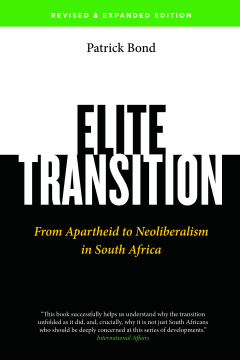
Additional Information
Book Details
Abstract
Released to coincide with the 20th anniversary of the end of apartheid, this is an updated edition of a best-selling work of political analysis. Patrick Bond, a former adviser to the ANC, investigates how groups such as the ANC went from being a force of liberation to a vehicle now perceived as serving the economic interests of an elite few.
This edition includes new analysis looking at the 2008 internal coup against Thabo Mbeki, the subsequent economic crisis and the massacre of miners at Marikana in 2012. Bond also assesses the historiography of the transition written since 2000 from nationalist, liberal and radical perspectives, and replies to critics of his work, both from liberal and nationalist perspectives.
This is an essential text on post-Apartheid South Africa, which will be vital reading for all who study or have an interest in this part of the continent, and in social change and neoliberal public policy more generally.
'An analysis of the compromises made between the past and present powers in post-apartheid South Africa, and it assesses the extent to which they can lead to meaningful liberation for the masses of South Africans'
Oxfam Review of Journals
'Charts the destruction of progressive economic and social policy aspirations from the end years of apartheid to today as a new elite emerges espousing neoliberal principles'
Socialist Review
'Successfully highlights some telling events and processes that help us understand why the transition unfolded as it did, and, crucially, why it is not just South Africans who should be deeply concerned at this series of developments'
International Affairs
Table of Contents
| Section Title | Page | Action | Price |
|---|---|---|---|
| Cover | Cover | ||
| Contents | v | ||
| List of Acronyms and Abbreviations | vi | ||
| Introduction: Dissecting South Africa's Transition | 1 | ||
| 1. Neoliberal Economic Constraints on Liberation | 13 | ||
| 2. Social Contract Scenarios | 42 | ||
| 3. Rumours, Dreams and Promises | 69 | ||
| 4. The Housing Question | 95 | ||
| 5. The World Bank as 'Knowledge Bank' (sic) | 121 | ||
| 6. Beyond Neoliberalism? South Africa and Global Economic Crisis | 150 | ||
| Afterword: From Racial to Class Apartheid | 198 | ||
| Afterword to the New Edition: South Africa Faces its 'Faustian Pact': Neoliberalism, Financialisation and Proto-Fascism | 240 | ||
| Notes and References | 275 | ||
| Index | 327 |
